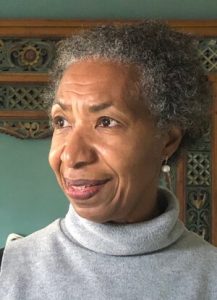Noreen Caplen-Spence shares her poems and thoughts with Ron Ragsdale
If language is the tool of thought,
James Joyce through Ulysses invented a way of thought
And Other Englishes an established view.
Slaves invented a language
Through music, visual art, action and words.
We hear it in 2020.
Our outside palette still unaccepted
Our trueness
Our lived experience
Our unapologetic need to breathe
Denied by those outside our palette.
We remain in exile
And alone
You do not shine more by
Putting out my glow
When together
We find ourselves.
When alone we die.
We are sick
We are tired
We are drowned
We are burned
We are lashed
We are sick
We need a new way
Of having and being
For all our sakes.
What prompted you to become an English language teacher?
I qualified as an operating theatre technician, but when I went to live in Cyprus in 1984 and did not speak Greek, I could not work in an operating theatre. I was asked to teach English to a few people, and I agreed.
After that, my husband and I went to live in Hong Kong. I did a course at the British Council while I was there, and my first job was as a language teacher in a private school in Wan Chai. When I returned to the UK it seemed like a good thing to carry on with, so I did a diploma and finally an MA.
Being a black teacher in an industry where you would have had so few, if any, role models, must have been daunting. What challenges have you had, and how have you responded?
I was not daunted, and didn’t really think of the obstacles. There are so many that I tend to take them one at a time. I was not afraid to be rejected because I know deep down that I would need to adjust to what I see, hear and feel. My survival is key.
My first seven years were spent in St Vincent. We were all black or black-ish. I was valued, loved and had the ability to learn. I saw other people who looked like me in positions of authority: a family member was the headmaster of the school I attended. All the holidays were spent with my second family. Both parents worked and the four boys were very able academically. There I had role models.
In the UK, there were role models who showed me the black British experience. I saw struggle. I saw people who didn’t give up. I saw people who helped each other as well as pull each other down!
I learn and I give people and institutions three chances. To survive as a black person, you need to be a good observer of white people. Watch and learn. Listen and learn. Keep something of yourself safe that can’t be damaged, even if the storms get rough.
You came to the UK as a child from St Vincent, as part of the ‘Windrush generation’. How has the political scandal concerning people who were detained, denied rights and threatened or actually deported from the UK by the Home Office affected you and your family?
We have been profoundly saddened for the individuals and their families and friends. It brought back some of the trauma of my childhood, and the feeling of not being part of somewhere you have tried and felt a sense of belonging. I wanted to escape. I felt that I was clinging on, barely.
I cannot watch the television when anything about this situation comes on. I cry. We are black and stateless. I believe it has touched black people in this country and made them feel insecure. The greatest disappointment is that the government systematically chose those who appeared to be weak and expected them to go quietly. It seems like a culling. The lesson there is make a noise so that others may suffer less.
The hostility towards the first immigrants and black people now, shows how some locals feel. I have always believed that British governments would not fully accept people who look foreign in their country. Governments tend to look at being re- elected.
Whenever there were subtle changes to immigration rules, we monitored and took appropriate action. As new immigrants, we did not want to tell family at “home” how it really was because we did not want their pity. Colourised photos, money and presents were sent so that they could see how good everything was. This was done at an unconscious level, of course. I can say that with my adult eyes.
When I look back to my childhood it was not an easy one. I did not tell my parents what was happening at school. Again, I wanted them to be proud of me. I wanted them to think that I could cope. I see that same behaviour in my sons. It is only when things get really bad that they speak about it.
The effect on me was profound. I know that there are people who think and act on the idea that I should not be here. This is a country for white people. As I sit here and write, I know how my feelings and behaviours have had to accommodate.
I feel sad for my sons, I feel I have made bad choices in continuing to live here. I feel for my white friends who try to make me feel loved and wanted. I have become more suspicious of native young men in groups. I listen carefully to declarations when government speaks and writes.
Why do you think the ELT industry (teaching, teacher-training, writing and publishing) is so white-dominated? Is it institutional racism, or just a perception of black faces not being welcome?
It is a combination. Firstly, those in a position to hire may feel they have no choice. It is a business and anyone or anything that can destroy their business should be avoided.
In my experience, black people are generally not seen as cognitively able. How can they be, after all, they were slaves. Slaves do physical work.
Or is it perhaps a distorted, racist view from learners around the world that an English teacher must be white to be authentic?
The mindset of schools is that their clients would prefer the ‘real thing.’ Someone white. “It’s only natural,” I was once told.
One client from a European country told me after the second day that he did not come to England to learn from a woman, let alone a black one. It seemed that I ticked two boxes. Oh, dear. However, I was not fired, I lived to teach another day.
An agent who sends children to the UK from an Asian country told a member of staff at one school that if he got rid of the black woman, they could send many children. Again, I survived.
How can we encourage more black students to consider teaching English as a career?
There must be a supportive atmosphere where all stakeholders believe in equality, honesty and clarity. There is a lot of double- speak around. I’ve seen many pages written about diversity. Now those words need to be activated.
There are black teachers out there. I wish them luck, but I would not recommend it unless there is a deep calling. It seems like we already live in a divided society and the additional trauma is not healthy.
What more do you think could and should be done to challenge the racism inherent in (white) native-speakerism, both from learners and administrators?
This requires such a shift of organisational culture, mind set and honesty, I think it might take a hundred years. My parents had hope for me. I do not have hope that my children will see that day. Only white people speak English properly.
Black and Human
Emancipate and liberate from those palpable chains.
Find freedom with every breath. Hold that sweet, fragrant inhalation.
Visualise a future with confidence and hope.
What is meant by the ‘black’ in Black Lives Matter?
It appears to me that there is an element of biology, in terms of a genotype and a phenotype. The genotype is the hereditary information the individual carries. The phenotype is what can be seen, i.e. behaviour, development and physical appearance. When an individual looks, ‘other,’ and cannot pass the ‘from here’ look, that could be a starting point.
However, if a person is not black enough to be considered black and not white enough to be considered white, they are in no-person land. What happens to their sense of self and identity?
What of those Third Culture Kids whose parents travelled to Europe and the North American continent in the 1950s onwards? Some born in the country they now reside, while others were taken to those countries when they were still children. So many questions about where is home. Where are you nurtured, and feel at home? The poem, Diaspora Blues by Ijeoma Umebinyou sums it up:
So,
Here you are
Too foreign for home
Too foreign for here
Not enough for both.
A product of mixed heritage needs to carve out their identity and often makes a choice dependent on how they are treated. A teenage male once said to me, “I behave like I’m black because that’s how the teachers treat me and my friends have my back.” I want to go somewhere I can be what I want to be.
It seems to me that Black Lives Matter only after a black death that the media chooses to tell us about. Otherwise, die quietly, accept you are not equal in any way, say sir and do what you are told.
I look at my grandparents. I’m sitting at a piano and they are here with me, here where I live. I have my two sons and I’m at peace, mostly. Until I turn on the news – and when I turn on the news, I just want to go out in the middle of the road and kneel – and just see what happens. What would happen, if an old black woman kneels in the middle of the road?
Having a job in teaching where the ‘learners’ are not black might upset the balance of power and give black people the sense of status, justice and a say in society. We can’t allow that to happen!
I once wrote a few words in Latin and was asked by a white man, “where did you learn Latin?” Swinging from the trees, was my reply. Private institutions consider the bottom line. Black teachers might devalue their product.
In my experience, their product is enhanced.

Noreen Caplen-Spence was born on the island of St Vincent. As a teacher-trainer for Pilgrims and the British Council, Noreen has addressed conferences, given workshops and facilitated teacher professional development around the world. She was the head of the International Study Centre at Kent College, Canterbury, for ten years. She has taught students from primary to post- graduate level and is interested in language learning within a cultural context, and how cultural understanding can improve our lives.





